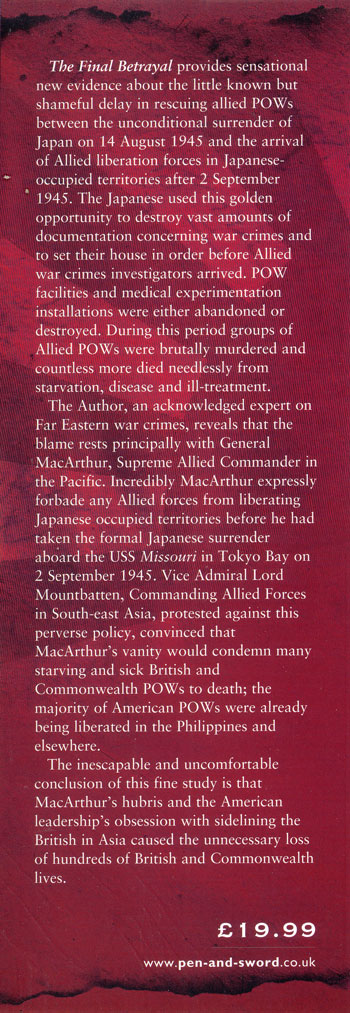



Introduction
'... a malarial ridden pestilential hollow in the hills would probably have been journey's end for most of us but providence, or the atomic bomb which we did not know about, intervened. You may choose according to your own persuasion but my money is on technology.'
Major Archie Black British POW, Saigon 1945
Bombs exploded with enormous, earth-shattering detonations that lit up the sky, and incendiaries rained down upon the port city of Kobe in Japan. High above roared big silver American B-29 Superfortresses, bringing death and destruction to the Japanese mainland in a hugely successful campaign to end the war early by destroying Japanese industrial capacity and civilian morale. If Japan could be bombed into submission, ran Allied logic, a hugely dangerous invasion of the Home Islands could be avoided. It was July 1945, and inside a POW camp just outside Kobe, where the prisoners had been brought as slave labourers, pandemonium reigned. The tinder dry huts where the prisoners slept were bursting into flames as American fire bombs tumbled down among them, the prisoners, most hardly able to walk after suffering years of severe hunger and disease at the hands of their Japanese tormentors, hobbled away like old men in the face of a wall of fire and scorching heat that advanced inexorably towards them. 'As we ran toward the gate I wandered why the bloke behind me sounded as though he was running in carpet slippers,' recalled Ronald Mayers, a British prisoner, 'it wasn't slippers, it was skin off his feet.'
Mayers saw only horror all around him, lit by the eerie glow of napalm fires. 'Another [prisoner] had all his hair burnt off, his face swelling up and another with terrible burns to his hands.' A guard opened the camp gate and bellowed at the prisoners to take shelter with some Japanese civilians up a hill away from the rising flames. 'It's a terrible thing to think that you've gone through years as a POW, starved, beaten, illnesses, used cruelly for slave labour, only to be bombed by your own people and sometimes killed even though they were unaware of it because none of these places were marked by the Japanese,' (1) said Mayers.
By the summer of 1945, for the tens of thousands of Allied POWs and civilian internees in concentration camps across Asia, the day of reckoning was almost upon them. Death had stalked them for years in the form of disease, starvation and the arbitrary sadistic brutality of their guards, but now with the war almost over, death could also come from one's own side. Many also feared what nefarious plan the Japanese may have yet harboured for their prisoners, because most simply could not believe that their tormentors would meekly allow them to be liberated when the end came. 'There were few of us who doubted that the Allies would, in the end, defeat Japan,' wrote British prisoner-of-war G.S. Gimson in 1945. 'What we did doubt was whether we would be alive to see that day.' (2)
By June and July 1945, those Allied prisoners who remained alive had already been through over three years of brutal Japanese imprisonment, and they had witnessed friends and colleagues die in unprecedented numbers. Those that were still alive were some of the mentally toughest and determined men and women, but as their health faded through exposure to disease, starvation and physical abuse, how much longer they could cling to life before liberation came was a thought uppermost in their minds. The terrible realisation was already setting in that many would make it almost to the end, only to die virtually at the point of liberation. It was all a question of timing — if Japan surrendered quickly and Allied forces were able to liberate the Occupied Territories post haste thousands would be saved. If, on the other hand, the Japanese resolutely fought it out to the 'last man, last bullet' the war would undoubtedly drag on into 1946 dooming thousands to certain death in the camps. 'Again, few failed to realise that the final stages would almost certainly be catastrophic for us,' continued Gimson. 'Whether we were still in areas which became battle grounds, or were force-marched away from these areas, or simply eliminated as an encumbrance to the Japs, the end promised disaster [author italics].' (3)
At Gimson's camp, and in hundreds of others across Asia, the prisoners were forced to dig 'moats' around the perimeter. While they laboured, naked and filthy, standing in watery mud contaminated with raw sewage, Gimson and his severely malnourished comrades talked in low voices among themselves about their likely fate. Dark hints from their Korean guards of a coming massacre did little to settle their nerves. Were these 'moats' actually to be their graves, was the question that many of the prisoners silently asked. 'From then on, as the signs of Allied domination increased, it became abundantly clear that the 'final solution' would not be long delayed.' (4) The Japanese had shown only contempt and unbelievable brutality towards all of their prisoners for three and a half long years. Would they suddenly become magnanimous in defeat? Few POWs thought that a very likely outcome from a people who had enjoyed plumbing the very depths of human depravity in their treatment of disarmed and vanquished foes.
Notes
1. A Soldiers Story Taken from His Taped Record: A POW in China and Japan by Joan Southgate, People's War, BBC History, http:/ /www.bbc.co.uk/history, Article ID: A2756360, accessed 13 March 2008.
2. Tom McGowan, Beyond the Bamboo Screen: Scottish Prisoners of War under the Japanese, (Dunfermline: Cualaun Press, 1999), 129.
3. Ibid: 129.
4. Ibid: 129.
#



